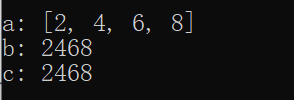We can use [expr(i) for i in somelist] to obtain a list in Python, which is so called List comprehension. In Julia, we can generate arrays in a similar way.
a = [i*i for i in 1:10]
println("a: ", a, ", typeof(a): ", typeof(a))
Execution output:
We see that we get an array using the same method as in Python.
Comprehensions can also be written without the enclosing square brackets, producing an object known as a generator (Base.Generator type).
g = (1/n for n=1:100)
println("g: ", g)
I tried some more complex array comprehensions and there are some slight differences from Python (ELSE-statement can be ignored but is highly recommended):
a1 = [i*i for i in 1:10 if i%2==0] # IF-condition filter at the end
a2 = [if i%2==0 i*i else 0 end for i in 1:10 ] # IF-ELSE statements ahead of FOR-statement; "end" keyword is required, whichis main difference with Python
a3 = [if i%2==0 i*i end for i in 1:10 ] # IF-statement without ELSE-condition definition, which yields 'nothing' in the result, "end" keyword is required
a4 = [i*j for i in 1:3 for j in 4:6]
println("a1: ", a1)
println("a2: ", a2)
println("a3: ", a3)
println("a4: ", a4)
Same as in Python, map() is also implemented:
# map() with anonymous functions
a5 = map(x -> x*x, 1:5)
a6 = map(x -> x%2==0 ? x*x : 0, 1:5)
g = (n+1 for n=1:10)
a7 = map(x -> x*x, g) # takes a generator object
println("a5: ", a5)
println("a6: ", a6)
println("a7: ", a7)
println(" ")
I tried map() and reduce() using given functions:
function func(x::Int)
if x%2 == 0
return x
else
return 0
end
end
a = map(func, 2:2:9) # supplies a one-argument function
println("a: ", a) # => [2, 4, 6, 8]
function foo(x::Int, y::Int)
return x*10+y
end
b = reduce(foo, a)
println("b: ", b)
c = mapreduce(func,foo, 2:2:9)
println("c: ", c)






Top comments (0)